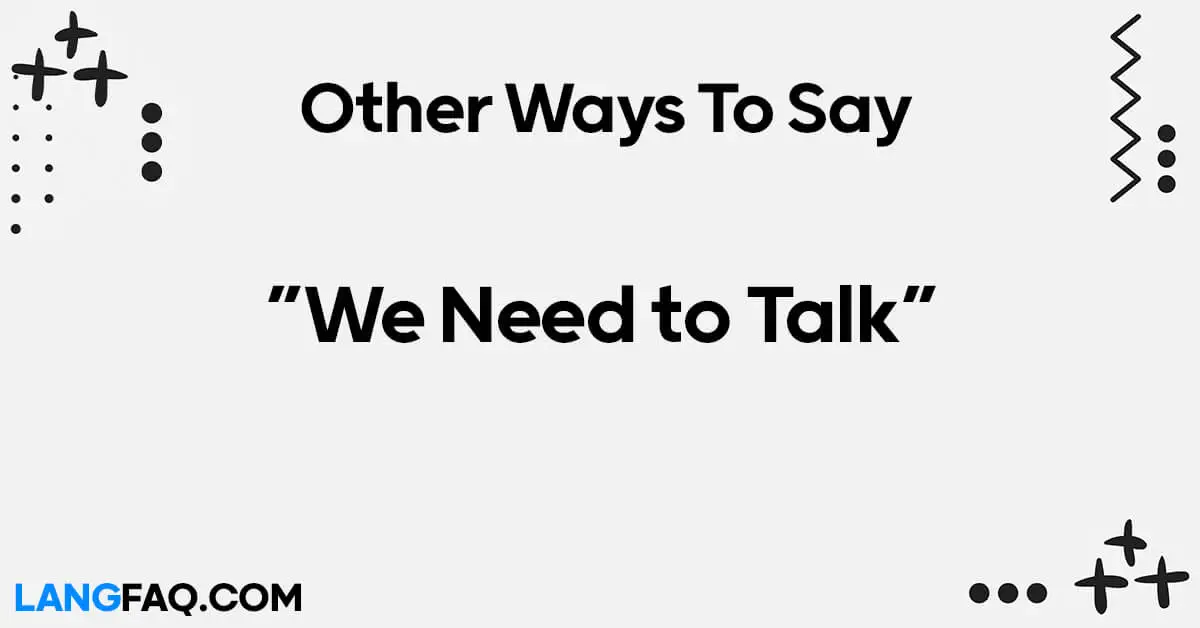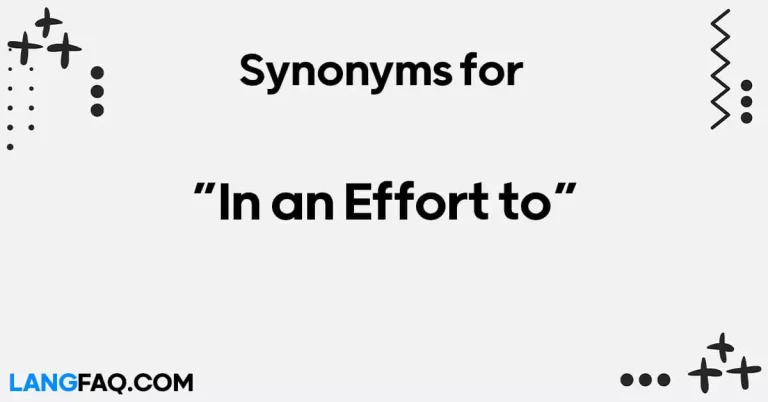Engaging in important discussions is a skill that can transform relationships and foster understanding. In this article, we’ll explore various ways to express the need for a crucial conversation, providing alternatives to the common phrase “We Need to Talk.” Enhance your communication toolbox and navigate delicate discussions with confidence.
12 Other Ways to Say “We Need to Talk”
Here are 12 alternative ways to say “We Need to Talk”:
- Let’s have a conversation.
- Can we discuss something important?
- I’d like to chat about a matter.
- It’s time for a heart-to-heart.
- We should address this matter.
- I want to bring up something crucial.
- Shall we talk about it?
- Time for a serious discussion.
- Can we have a moment to talk?
- Let’s engage in an important dialogue.
- There’s something on my mind; can we talk?
- We need to have an open conversation.
Here’s a table with meanings and examples for the 12 alternative ways to say “We Need to Talk”:
| Expression | Meaning | Example |
|---|---|---|
| Let’s have a conversation | Suggesting a discussion or dialogue | “Let’s have a conversation about our future plans.” |
| Can we discuss something important? | Seeking to address a crucial matter | “Can we discuss something important after dinner?” |
| I’d like to chat about a matter | Expressing the desire for a discussion | “I’d like to chat about a matter that’s been bothering me.” |
| It’s time for a heart-to-heart | Indicating a need for a sincere and open conversation | “It’s time for a heart-to-heart about our relationship.” |
| We should address this matter | Suggesting the need to focus on a specific issue | “We should address this matter before it escalates.” |
| I want to bring up something crucial | Expressing the importance of the topic | “I want to bring up something crucial regarding our project.” |
| Shall we talk about it? | Inviting discussion on a particular subject | “Shall we talk about the upcoming changes in the team?” |
| Time for a serious discussion | Indicating the need for a thoughtful conversation | “It’s time for a serious discussion about our financial goals.” |
| Can we have a moment to talk? | Requesting a brief time for a conversation | “Can we have a moment to talk before the meeting starts?” |
| Let’s engage in an important dialogue | Suggesting a meaningful conversation | “Let’s engage in an important dialogue about our community project.” |
| There’s something on my mind; can we talk? | Expressing a need to share thoughts | “There’s something on my mind; can we talk about it later?” |
| We need to have an open conversation | Emphasizing the importance of an honest discussion | “We need to have an open conversation about our expectations.” |
These alternative expressions provide a variety of ways to convey the need for a serious or important discussion, allowing for more nuanced and considerate communication in different situations. Choose the phrase that best fits the tone and context of your conversation to enhance effective communication.
Is It Correct to Say “We Need to Talk”?
The phrase “We need to talk” is correct in its grammatical construction, and it effectively communicates the intention to have a conversation. However, it’s essential to consider the context and tone in which it is used.
Context and Tone:
- Formality: This phrase is generally more casual and can be used in both personal and professional settings. In a formal or professional context, you might choose alternative expressions to convey the same message with a more polished tone.
- Relationship Dynamics: Consider the nature of the relationship between you and the other person. In more personal relationships, this phrase might be well-received. In professional settings, especially when addressing colleagues or superiors, a slightly more formal approach could be appropriate.
Usage Insights:
- Directness: “We need to talk” is straightforward and to the point, making it clear that a conversation is necessary. However, this directness can sometimes be perceived as abrupt, especially if the topic is sensitive.
- Preparation: Using this phrase may prompt the other person to wonder about the nature of the conversation, potentially causing anxiety. Providing a bit of context or reassurance can help set the tone and alleviate concerns.
Example Dialogue:
Person A: “Hey, we need to talk.” Person B: “Sure, about what?” Person A: “I’ve noticed some challenges in our recent projects that I believe we should address. Can we discuss it together?”
Grammar and Structure:
The phrase follows standard English grammar rules and is appropriate for both spoken and written communication. When used in writing, it’s essential to maintain a respectful and considerate tone.
Tips for Effective Use:
- Provide Context: Briefly mention the topic or reason for the conversation to give the other person a heads-up.
- Choose Appropriate Setting: Ensure that the environment is conducive to open communication.
- Consider the Relationship: Adjust the formality based on the nature of your relationship with the other person.
In conclusion, while “We need to talk” is grammatically correct, being mindful of the context, tone, and the dynamics of the relationship can enhance the effectiveness of your communication.
Professional Mail Example With “We Need to Talk”
Subject: Discussion Regarding Recent Project Developments
Dear [Recipient’s Name],
I hope this email finds you well. I wanted to reach out as there are some developments in our recent projects that I believe require our immediate attention. In this regard, I feel it’s crucial that we have a conversation to discuss these matters and strategize a way forward.
The purpose of our discussion is to align our efforts and ensure the successful progression of the projects. Your insights are highly valuable, and I believe a focused conversation can help us address any challenges and capitalize on opportunities.
Would it be possible for you to allocate some time for a meeting this week? I suggest a brief discussion where we can delve into the details and collaboratively find solutions. Your availability on [Proposed Date/Time] would be greatly appreciated. If this time is inconvenient, please let me know a slot that suits you better.
I understand the importance of your time, and I assure you that our discussion will be concise yet productive. Your commitment to our projects is highly valued, and I look forward to our conversation.
Thank you for your attention to this matter, and I appreciate your prompt response.
Best regards,
[Your Full Name] [Your Position] [Your Contact Information]
Let’s Have a Conversation
Initiating discussions is a crucial aspect of effective communication. When you find yourself in a situation where an open and honest dialogue is necessary, saying “Let’s have a conversation” can set the tone for a respectful exchange of ideas.
When to Use:
This phrase is versatile and can be employed in both formal and informal settings. It’s ideal for professional contexts, such as business meetings or performance reviews, as well as personal situations where a heart-to-heart talk is needed.
Example:
Scenario: Colleague Discussion Colleague: “I’ve noticed some challenges in our recent projects. Let’s have a conversation about how we can improve our teamwork.”
Email Sample:
Subject: Proposal for a Team Discussion
Dear [Colleague’s Name],
I hope this email finds you well. I’ve been reflecting on our recent projects and believe it would be beneficial for us to have a conversation about how we can enhance our collaboration. Could we schedule a meeting to discuss this further? Looking forward to your thoughts.
Best regards, [Your Name]
Variations:
- Let’s discuss this matter.
- I’d like to talk about our progress.
- Shall we engage in a dialogue on the project?
Dictionary Insight: The Cambridge Dictionary defines “conversation” as a formal or informal talk involving two or more people, especially one in which news and ideas are exchanged.
Pros:
- Conveys a willingness to engage.
- Neutral and suitable for various contexts.
Cons:
- May sound formal in very casual settings.
Tips: Use a friendly tone and encourage active participation to create a constructive dialogue.
Can We Discuss Something Important?
When dealing with sensitive matters that require careful consideration, using the phrase “Can we discuss something important?” helps convey the gravity of the topic at hand.
When to Use:
This phrase is best employed in formal situations or when addressing significant issues in personal relationships. It sets the stage for a focused and respectful conversation.
Example:
Scenario: Supervisor-Employee Meeting Supervisor: “Can we discuss something important in our next one-on-one? It’s regarding your recent project performance.”
Email Sample:
Subject: Request for a Meeting to Discuss Project Performance
Dear [Employee’s Name],
I hope this email finds you well. I would like to schedule a meeting to discuss something important regarding your recent project performance. Could we find a suitable time for this discussion? Looking forward to our conversation.
Best regards, [Supervisor’s Name]
Variations:
- I’d like to address a crucial matter.
- Could we have a serious conversation?
- Let’s delve into a significant topic.
Dictionary Insight: The term “discuss” is defined as talking about something with someone and exchanging ideas or opinions.
Pros:
- Indicates the importance of the topic.
- Encourages focused conversation.
Cons:
- May sound formal for casual discussions.
Tips: Use a calm and composed tone to ensure the seriousness of the conversation is respected.
I’d Like to Chat About a Matter
Expressing the desire for a discussion in a friendly and approachable manner can be achieved by saying, “I’d like to chat about a matter.”
When to Use:
This phrase is suitable for casual or informal conversations, making it ideal for discussions among friends, family, or colleagues in a relaxed setting.
Example:
Scenario: Friends Catching Up Friend 1: “I’d like to chat about a matter that’s been on my mind lately. Are you free for coffee this weekend?”
Email Sample:
Subject: Let’s Catch Up
Hi [Friend’s Name],
I hope this email finds you well. I’ve been wanting to chat about a matter that’s been on my mind. How about grabbing a coffee this weekend? Let me know if you’re available.
Cheers, [Your Name]
Variations:
- Mind if we chat about something?
- Fancy a chat about this issue?
- Let’s have a friendly chat about it.
Dictionary Insight: “Chat” is defined as a friendly and informal conversation.
Pros:
- Creates a relaxed and open atmosphere.
- Suitable for personal relationships.
Cons:
- May sound too casual for formal discussions.
Tips: Ensure the setting is appropriate for a more informal chat, and be mindful of the other person’s comfort level.
It’s Time for a Heart-to-Heart
For more intimate conversations that require sincerity and vulnerability, using the phrase “It’s time for a heart-to-heart” conveys the depth of the forthcoming discussion.
When to Use:
This phrase is best reserved for personal relationships, addressing emotional topics or situations where a deep, honest connection is needed.
Example:
Scenario: Romantic Partners Partner 1: “It’s time for a heart-to-heart about our future together. Can we sit down and talk tonight?”
Email Sample:
Subject: Request for a Heart-to-Heart Conversation
Dear [Partner’s Name],
I’ve been thinking about our future and believe it’s time for a heart-to-heart conversation. Are you available to sit down and discuss this tonight? Looking forward to our talk.
Love, [Your Name]
Variations:
- We need to have a sincere talk.
- Let’s have an open and honest conversation.
- Can we talk heart-to-heart about this?
Dictionary Insight: “Heart-to-heart” is defined as a sincere and intimate conversation between two people.
Pros:
- Emphasizes sincerity and vulnerability.
- Ideal for deepening emotional connections.
Cons:
- May be too personal for certain professional contexts.
Tips: Ensure a private and comfortable setting for this type of conversation, allowing both parties to express themselves openly.
Continue reading the remaining alternative ways to say “We Need to Talk” in the next part of the article.
We Should Address This Matter
When a specific issue needs attention and resolution, expressing it as “We should address this matter” maintains a professional yet direct tone.
When to Use:
This phrase is suitable for workplace scenarios or formal settings where addressing a specific concern or problem is necessary.
Example:
Scenario: Team Meeting Team Leader: “We should address this matter of incomplete project documentation. It’s affecting our overall efficiency. Let’s discuss solutions in our next meeting.”
Email Sample:
Subject: Proposal for Addressing Project Documentation Issue
Dear Team,
I believe it’s crucial that we address the matter of incomplete project documentation. This is impacting our efficiency, and I propose we discuss possible solutions in our upcoming meeting. Looking forward to your input.
Best regards, [Your Name]
Variations:
- Let’s tackle this issue head-on.
- We need to resolve this concern.
- Can we discuss addressing this issue?
Dictionary Insight: “Address” is defined as giving attention to or dealing with a matter or problem.
Pros:
- Direct and to the point.
- Suitable for formal or professional discussions.
Cons:
- May sound too formal for casual conversations.
Tips: Provide clear examples or evidence when using this phrase to highlight the urgency of addressing the matter.
I Want to Bring Up Something Crucial
Expressing the significance of a topic can be done by saying, “I want to bring up something crucial,” setting the stage for an important conversation.
When to Use:
This phrase is versatile, suitable for both professional discussions and personal conversations where the gravity of the topic needs emphasis.
Example:
Scenario: Project Team Briefing Team Member: “I want to bring up something crucial regarding the upcoming client presentation. It’s about the proposed timeline, and I believe we need to revisit it.”
Email Sample:
Subject: Importance of Discussing Presentation Timeline
Dear Team,
I hope this email finds you well. I want to bring up something crucial regarding the upcoming client presentation – specifically, the proposed timeline. I believe we need to revisit it to ensure a successful outcome. Looking forward to our discussion.
Best, [Your Name]
Variations:
- This is something critical we need to talk about.
- Can we discuss this crucial matter?
- I’d like to address something of utmost importance.
Dictionary Insight: “Crucial” is defined as of great importance or significance.
Pros:
- Emphasizes the importance of the topic.
- Suitable for various contexts.
Cons:
- May sound too serious for very casual settings.
Tips: Frame the conversation positively by expressing a shared goal or outcome related to the crucial matter.
Shall We Talk About It?
Inviting discussion with a question like “Shall we talk about it?” provides an open and collaborative tone, encouraging mutual participation.
When to Use:
This phrase is suitable for both formal and informal contexts, fostering an atmosphere of cooperation and inclusivity.
Example:
Scenario: Project Collaboration Team Member: “There have been challenges in meeting project deadlines. Shall we talk about it in our next team meeting and brainstorm solutions together?”
Email Sample:
Subject: Proposal for Team Discussion on Project Deadlines
Dear Team,
I’ve noticed challenges in meeting project deadlines, and I suggest we talk about it in our next team meeting. I believe collaborative brainstorming can lead to effective solutions. Looking forward to our discussion.
Best regards, [Your Name]
Variations:
- Can we discuss this matter collaboratively?
- Shall we have a conversation about our challenges?
- I propose we talk about this collectively.
Dictionary Insight: “Shall” is used to make suggestions or offers, often inviting agreement or permission.
Pros:
- Encourages collaboration.
- Suitable for various settings.
Cons:
- May sound too formal for casual conversations.
Tips: Ensure an inclusive tone by expressing a shared goal or objective in the discussion.
Time for a Serious Discussion
For matters requiring focused attention and a formal approach, stating “Time for a serious discussion” conveys the gravity of the upcoming conversation.
When to Use:
This phrase is best employed in professional or formal settings where the seriousness of the topic demands a composed and focused approach.
Example:
Scenario: Board Meeting Board Chair: “Given the recent financial challenges, it’s time for a serious discussion on restructuring. Let’s schedule a dedicated meeting to address this issue.”
Email Sample:
Subject: Request for a Special Meeting on Financial Restructuring
Dear Board Members,
In light of recent financial challenges, I believe it’s time for a serious discussion on the topic of restructuring. I propose we schedule a dedicated meeting to thoroughly address this matter. Looking forward to your availability.
Best regards, [Your Name]
Variations:
- We need to have a formal conversation about this.
- Let’s address this matter seriously.
- Can we dedicate time for a focused discussion?
Dictionary Insight: “Serious” is defined as demanding careful consideration or application.
Pros:
- Conveys the importance and formality of the discussion.
- Ideal for professional contexts.
Cons:
- May sound too formal for casual discussions.
Tips: Ensure the agenda and objectives of the serious discussion are clearly communicated beforehand.
Can We Have a Moment to Talk?
Requesting a brief moment for a conversation is a considerate way to approach discussions that require immediate attention. Saying “Can we have a moment to talk?” shows respect for the other person’s time.
When to Use:
This phrase is versatile and can be used in both personal and professional contexts, especially when a quick and focused discussion is needed.
Example:
Scenario: Team Collaboration Colleague: “Can we have a moment to talk about the adjustments needed in our project presentation? I believe a quick discussion can help us align our strategies.”
Email Sample:
Subject: Request for a Brief Discussion on Project Presentation
Dear [Colleague’s Name],
Could we have a moment to talk about the adjustments needed in our project presentation? I believe a quick discussion can help us align our strategies. Let me know when you’re available.
Best regards, [Your Name]
Variations:
- Mind if we take a moment to discuss this?
- Can we have a brief conversation about it?
- I’d like to talk briefly about this matter.
Dictionary Insight: “Moment” refers to a very brief period of time.
Pros:
- Shows consideration for the other person’s time.
- Ideal for quick and focused discussions.
Cons:
- May sound too formal for very casual conversations.
Tips: Ensure the conversation stays concise and focused on the immediate matter at hand.
Let’s Engage in an Important Dialogue
Framing a discussion as an important dialogue elevates the conversation, emphasizing its significance. Saying “Let’s engage in an important dialogue” sets the expectation for a thoughtful and meaningful exchange.
When to Use:
This phrase is suitable for various formal settings, such as business meetings, workshops, or academic discussions, where depth and substance are essential.
Example:
Scenario: Academic Panel Discussion Panel Moderator: “Let’s engage in an important dialogue about the impact of technology on education. Each of our perspectives is valuable in understanding this evolving landscape.”
Email Sample:
Subject: Invitation to Participate in an Important Dialogue
Dear [Panelist’s Name],
I hope this email finds you well. I would like to invite you to engage in an important dialogue during our upcoming academic panel discussion on the impact of technology on education. Your insights will greatly contribute to our exploration of this critical topic.
Best regards, [Your Name]
Variations:
- We need to have a substantial conversation about this.
- Can we engage in a meaningful dialogue on the subject?
- Let’s delve into this matter with an important discussion.
Dictionary Insight: “Dialogue” is a conversation between two or more people, especially one directed towards exploration of a particular subject or resolution of a problem.
Pros:
- Elevates the conversation to a more formal and substantive level.
- Ideal for intellectual or thought-provoking discussions.
Cons:
- May sound too formal for casual settings.
Tips: Encourage participants to share their insights and perspectives, fostering a collaborative atmosphere.
There’s Something on My Mind; Can We Talk?
Expressing the need for a conversation with vulnerability can be achieved by saying, “There’s something on my mind; can we talk?” This phrase opens the door for sharing personal thoughts or concerns.
When to Use:
This phrase is well-suited for personal relationships, both in professional and informal settings, where sharing personal thoughts or emotions is valued.
Example:
Scenario: Friends Reconnecting Friend 1: “There’s something on my mind; can we talk about it? I value your perspective, and I think discussing it with you could help me gain clarity.”
Email Sample:
Subject: Request for a Personal Conversation
Hi [Friend’s Name],
I hope this email finds you well. There’s something on my mind that I’d like to discuss, and I believe your perspective could be valuable. Can we find some time to talk? Looking forward to our conversation.
Best, [Your Name]
Variations:
- I’d like to share something that’s been on my mind.
- Can we have a talk about what’s been bothering me?
- Mind if we discuss something that’s been on my mind?
Dictionary Insight: The phrase “on my mind” refers to something a person is thinking about or preoccupied with.
Pros:
- Conveys vulnerability and openness.
- Ideal for deepening personal connections.
Cons:
- May sound too personal for certain professional contexts.
Tips: Ensure the other person feels comfortable and open to engaging in a more personal conversation.
We Need to Have an Open Conversation
Emphasizing openness in a discussion can be achieved by saying, “We need to have an open conversation.” This phrase encourages transparency and honesty in the exchange of ideas.
When to Use:
This phrase is suitable for a variety of settings, including both personal and professional, where fostering open communication is essential.
Example:
Scenario: Manager-Employee Feedback Manager: “We need to have an open conversation about your recent performance. This is an opportunity for us to discuss strengths and areas for improvement together.”
Email Sample:
Subject: Request for an Open Conversation on Performance
Dear [Employee’s Name],
I hope this email finds you well. I believe we need to have an open conversation about your recent performance. This will provide us with an opportunity to discuss your strengths and areas for improvement together. Can we schedule a meeting for this discussion?
Best regards, [Manager’s Name]
Variations:
- Let’s discuss this openly.
- We should have a transparent conversation about this.
- Can we talk openly about the situation?
Dictionary Insight: “Open conversation” refers to a dialogue where participants express themselves freely, without reservation.
Pros:
- Emphasizes transparency and honesty.
- Suitable for a variety of contexts.
Cons:
- May sound too formal for casual conversations.
Tips: Establish ground rules that encourage all parties to express themselves openly without fear of judgment.
FAQs
How can I initiate a difficult conversation without causing tension? To initiate a difficult conversation smoothly, focus on framing your words positively. Choose phrases that express your desire for an open and honest discussion, creating a safe space for both parties.
What’s the best way to address sensitive topics without hurting feelings? Addressing sensitive topics requires empathy. Choose your words carefully, emphasizing your concern and using phrases that convey understanding and support.
How do I navigate uncomfortable conversations without making things worse? Navigating uncomfortable conversations requires tact. Use phrases that acknowledge the discomfort while expressing your willingness to listen and find common ground.
Is it possible to discuss significant matters without causing stress? Yes, choosing the right words can make a significant difference. Focus on phrases that promote collaboration, understanding, and a shared commitment to finding solutions.
How do I seek resolution in a conflict without escalating tensions? Seeking resolution involves choosing words that emphasize collaboration and common ground. Express your desire for a positive outcome, ensuring both parties feel heard and valued.
What’s the best way to clarify misunderstandings without causing conflict? Address misunderstandings by choosing words that promote clarity and understanding. Be open to listening and providing explanations, fostering a constructive conversation.
Conclusion:
Effective communication is the cornerstone of healthy relationships. By incorporating these alternative phrases into your conversations, you can transform the way you approach delicate discussions. Embrace the art of communication, fostering understanding, empathy, and growth in your relationships.







